
-
 Most UK doctors suffer from 'compassion fatigue': poll
Most UK doctors suffer from 'compassion fatigue': poll
-
Everton boss Dyche unconcerned by Maupay jibe

-
 FBI probes potential accomplices in New Orleans truck ramming
FBI probes potential accomplices in New Orleans truck ramming
-
Secret lab developing UK's first quantum clock: defence ministry
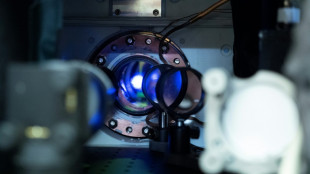
-
 Premier League chief fears Club World Cup's impact on Man City and Chelsea
Premier League chief fears Club World Cup's impact on Man City and Chelsea
-
US mulls new restrictions on Chinese drones

-
 Wall Street dons early green after Asia starts year in red
Wall Street dons early green after Asia starts year in red
-
Rosita Missoni of Italy's eponymous fashion house dies age 93

-
 27 sub-Saharan African migrants die off Tunisia in shipwrecks
27 sub-Saharan African migrants die off Tunisia in shipwrecks
-
UK grime star Stormzy banned from driving for nine months

-
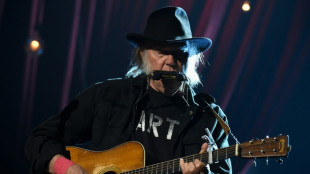 Neil Young dumps Glastonbury alleging 'BBC control'
Neil Young dumps Glastonbury alleging 'BBC control'
-
Djokovic, Sabalenka into Brisbane quarters as rising stars impress

-
 Swiatek battles back to take Poland into United Cup semis
Swiatek battles back to take Poland into United Cup semis
-
Electric cars took 89% of Norway market in 2024

-
 Stock markets begin new year with losses
Stock markets begin new year with losses
-
Rival South Korea camps face off as president holds out

-
 French downhill ace Sarrazin out of intensive care
French downhill ace Sarrazin out of intensive care
-
Djokovic cruises past Monfils as rising stars impress in Brisbane

-
 Montenegro mourns after gunman kills 12
Montenegro mourns after gunman kills 12
-
Sales surge in 2024 for Chinese EV giant BYD

-
 Agnes Keleti, world's oldest Olympic champion, dies at 103
Agnes Keleti, world's oldest Olympic champion, dies at 103
-
Asian stocks begin year on cautious note

-
 Andreeva, Mpetshi Perricard showcase Australian Open potential
Andreeva, Mpetshi Perricard showcase Australian Open potential
-
South Korea police raid Jeju Air, airport over fatal crash

-
 Perera's 46-ball ton gives Sri Lanka consolation T20 win over New Zealand
Perera's 46-ball ton gives Sri Lanka consolation T20 win over New Zealand
-
Afghan refugees suffer 'like prisoners' in Pakistan crackdown

-
 Coach tight-lipped on whether Rohit will play in final Australia Test
Coach tight-lipped on whether Rohit will play in final Australia Test
-
Blooming hard: Taiwan's persimmon growers struggle
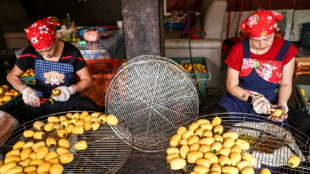
-
 South Korea's impeached president resists arrest over martial law bid
South Korea's impeached president resists arrest over martial law bid
-
Knicks roll to ninth straight NBA win, Ivey hurt in Pistons victory

-
 'Numb' New Orleans grapples with horror of deadly truck attack
'Numb' New Orleans grapples with horror of deadly truck attack
-
Asia stocks begin year on cautious note

-
 FBI probes 'terrorist' links in New Orleans truck-ramming that killed 15
FBI probes 'terrorist' links in New Orleans truck-ramming that killed 15
-
2024 was China's hottest year on record: weather agency
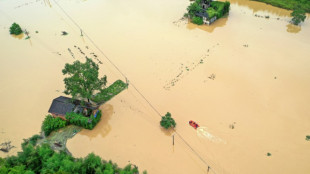
-
 Perera smashes 46-ball ton as Sri Lanka pile up 218-5 in 3rd NZ T20
Perera smashes 46-ball ton as Sri Lanka pile up 218-5 in 3rd NZ T20
-
South Korea police raid Muan airport over Jeju Air crash that killed 179

-
 South Korea's Yoon resists arrest over martial law bid
South Korea's Yoon resists arrest over martial law bid
-
Sainz set to step out of comfort zone to defend Dakar Rally title

-
 New Year's fireworks accidents kill five in Germany
New Year's fireworks accidents kill five in Germany
-
'I'm Still Here': an ode to Brazil resistance
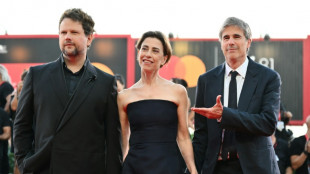
-
 New Orleans attack suspect was US-born army veteran
New Orleans attack suspect was US-born army veteran
-
Australia axe Marsh, call-up Webster for fifth India Test

-
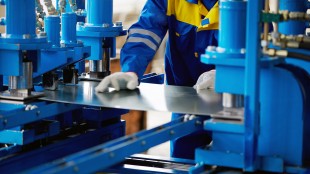 5 Tips for Protecting Your Children’s Health
5 Tips for Protecting Your Children’s Health
-
What are the risks of taking out a personal loan?

-
 DirectTrust(R) Announces 2025 Accreditation Criteria Versions for All Accreditation Programs
DirectTrust(R) Announces 2025 Accreditation Criteria Versions for All Accreditation Programs
-
BOK Financial Corporation announces Fourth Quarter 2024 Earnings Conference Call
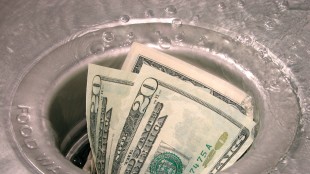
-
 Firstleaf Reveals Its New Award-Winning Wines And Trend Forecast
Firstleaf Reveals Its New Award-Winning Wines And Trend Forecast
-
Radius Pharmaceuticals Announces Licensing Agreement with Pharmanovia to Register and Commercialize Abaloparatide in China and Select Asia Pacific Territories

-
 BlackBerry Unveils Strategic Relaunch of QNX Brand to Reinforce Leadership in Automotive and General Embedded Industries
BlackBerry Unveils Strategic Relaunch of QNX Brand to Reinforce Leadership in Automotive and General Embedded Industries
-
AURI Inc., Announces European Market Crypto Processing


For the first time, Syrians 'not afraid' to talk politics
For decades, any Syrian daring to broach political topics got used to speaking in hushed tones and with a watchful eye trained for a listener among the crowd.
"There were spies everywhere," Mohannad al-Katee said in Al-Rawda cafe in Damascus, adding almost in disbelief: "It's the first time that I sit in a cafe and I can talk about politics.
"It was a dream for Syrians," said Katee, 42, a researcher in political and social history.
Until now, he like thousands of others had grown accustomed to watching for the proverbial flies on the walls of Damascus's renowned cafes.
Today, those same cafes are alive and buzzing with the voices of patrons speaking freely about their country for the first time.
Such discussions "were banned under the previous regime, then there was a relative opening during the Damascus Spring", Katee said.
He was referring to the year 2000, when Bashar al-Assad took over from his late father Hafez and slightly loosened the reins on political life in Syria.
Initially, the young Assad had opened up an unprecedented space, allowing for political salons to flourish alongside calls for reform in a country that had long grown accustomed to fear and silence.
"But it didn't last," said Katee.
A few months after his succession, Assad rolled back those gains, putting an end to the short-lived "Damascus Spring".
In the subsequent years, according to Katee, informants were ubiquitous, from "the hookah waiter to the man at the till, it could have been anyone".
- 'The walls have ears' -
Politically active since 1998, he fled to Saudi Arabia in 2012, a year after the outbreak of Arab Spring protests whose violent repression led to the eruption of the nearly 14-year civil war.
"Political life consisted of secret meetings," he said. "We were always taught that the walls have ears."
Today, "Syrians can never go back to obscurantism and dictatorship, to accepting single-party rule," he said.
A little further on, in the Havana cafe once known as a meeting point for intellectuals and activists in a distant past, Fuad Obeid is chatting with a friend.
Himself a former owner of a cafe he had to shut down, the 64-year-old said: "The intelligence services spent their time at my place. They drank for free as though they owned the place."
For over 50 years, the Assads maintained their vice grip on society, in large part through the countless informants that walked among the population.
On Saturday, Syria's new intelligence chief, Anas Khattab, announced that the service's various branches would be dissolved.
Obeid said: "I used to keep a low profile so they wouldn't know I was the owner. I told customers not to talk politics for fear of reprisals."
Now, he noted, in Havana cafe as in others, the difference is like "night and day".
- 'Truly free' -
Back in Al-Rawda, discussions are in full swing over hookahs and games of backgammon.
The owner Ahmad Kozorosh still can't believe his eyes, having himself witnessed numerous arrests in his own cafe over the years.
"I am now seeing almost exclusively new faces," he said. "People who had been sentenced to death, imprisoned."
To celebrate the new era, he is holding weekly symposiums in the cafe, and will even launch a new political party to be named after it.
Real estate agent Nesrine Shouban, 42, had spent three years in prison for carrying US dollars, a punishable offence in Assad's Syria.
Alongside thousands of others who found freedom when the doors of prisons were flung open, she was released on December 8 from the notorious Adra prison.
"They had dangled in front of us the possibility of an amnesty" from Assad's administration, she said. "Thankfully, the amnesty came from God."
"At cafes, we didn't dare say anything. We were even afraid that our phones were bugged," she said.
Now, for the first time, she said she felt "truly free".
Despite concerns over the radical Islamist background of Syria's new rulers, a breath of freedom has washed over the country for the first time, with public demonstrations being organised -- an unthinkable prospect just one month earlier.
"We are not afraid anymore," said Shouban. "If Jolani makes mistakes, we will denounce them," she added, referring to Syria's new leader Ahmed al-Sharaa, known by his nom de guerre Abu Mohammad al-Jolani.
"In all cases, it can't be worse than Bashar al-Assad."
L.Mason--AMWN